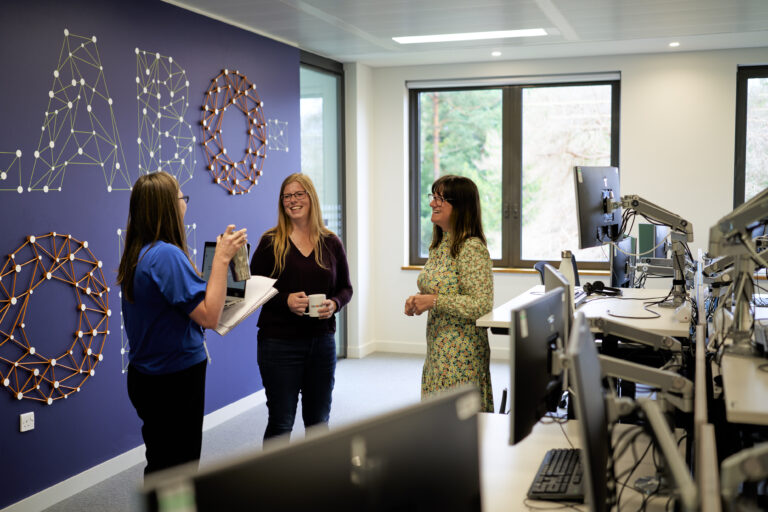
As technological advancements continue to define modern life, the demand for software engineers is at an all-time high. This particular job function, however, remains a male-dominated choice, reflecting an industry-wide trend whereby only 19.1% of the technology workforce in Europe is female.[1]
Discover’s Director for Application Development, Charlie Walters, is a passionate advocate for inclusive leadership and creating accessibility throughout the industry. She wants to shine a light on the barriers that women often face and how we can dismantle them to create true inclusivity throughout the industry.
What do we need to consider when we talk about barriers to the tech industry for women?
Research shows that when there are nine or more obstacles in a person’s day-to-day working life, their desire to stay in the organisation drops significantly — from 57% to 22%.[1] So, if you don’t tackle these barriers, there is a real risk that your talent will leave. That’s why, at Discover, we try to be as transparent as possible with our teams. We want to identify those barriers and friction points and collectively drive towards removing them. In the everywoman webinar, Overcoming barriers in software engineering, we touched on specific career barriers, such as being a parent, being neurodiverse or even just being in the minority as a woman, particularly in the software engineering space — and then we looked at coping strategies for the challenges that can come with those barriers. When it comes to women in tech, we often talk about impostor syndrome and other things that can make it difficult for us to progress, such as bias, but whilst it’s important to discuss those things, we don’t, I think, talk enough as women about our day jobs and what we deliver. I’m often asked to talk about how I have succeeded as a ‘woman in tech’. Personally, I would much rather talk about how I do my work, how I lead the data strategy in my space and how I can be a role model not just as a woman but as someone doing their job. I don’t just want to be seen as a woman who’s leading a ‘women in tech’ community; I want to be seen as a great data strategist and a woman leading technology.
[1] Research by WomenTech Network
[2] Research by Gartner (2022)
What do you think is the biggest barrier today for women in software engineering?
I think it’s confidence, which is something that came up strongly in the everywoman Tech Hub webinar when we put this question out to the community. Similarly, it’s about women recognising their competence, ability, and their potential. Self-doubt is about being your own barrier, ultimately. And for those considering the industry as a career option, a barrier can also be a lack of understanding of what tech ‘is’ and who tech people ‘are’. Some people might look at tech as a career and say, ‘it’s not interesting’, but they probably don’t realise there are many different elements, even to a technical role. You don’t have to be a hardcore programmer to find your passion or come with a degree in computer science to be good in the tech industry. We want problem-solving mindsets, the ability to go and explore, understanding and the aptitude to learn; having these skill sets are what’s important. Does the industry always look for that persistence and problem-solving mindset in the right way though? Maybe not…
How does Discover embed inclusivity in its business culture?
Discover has inclusivity training and the way in which that works is that when we are designing products, we ask from the start: Who’s included in the design and who isn’t? Who benefits and who is disadvantaged? It’s vital that any group building a product brings different perspectives into it, so you must make sure you have the right people involved. This kind of training teaches you to not focus entirely on your target audience; but also, to think, ‘who have I left out?’ That even extends out to things like the idea of having a ‘women in tech’ community — and asking who does that leave out and what impact does that have? Those were the kinds of interesting discussions we were having in the training, and it had an impact. For example, we were setting up some awards for the ‘women in tech’ community at the time, but we’ve now extended them out to include more people, so it becomes an event brought to you by women in tech, but not only for women in tech.
How has inclusivity training at Discover impacted you as a leader?
I use questions from the training to support conversations that I am having in my role. When you’re running a workshop, asking yourself who’s included and who isn’t makes it really obvious which stakeholders you need to invite beyond your local team. It forces you to ask who else could contribute and bring a new perspective. seen a few people having this kind of ‘open-mindedness’. But we could all still do more.
Are there any barriers that are industry specific to FinTech?
I worked in insurance for a large part of my career, and we had a lot of support as technical people due to the Chartered Insurance Institute training, which is incredibly valuable when you want to understand the context of what you’re working on. I didn’t realise just how valuable that knowledge was until I stepped into FinTech having never worked in this area before. The context of what I’m working on now is even more complicated and therefore harder to tap into and understand. That can be one of those ‘frictions’ I talked about earlier. I also see people struggling with not necessarily knowing how things connect, and this can cause friction because you end up not understanding the implications of how your piece of work fits in. One of the everywoman Tech Hub members talked about how powerful it is to build community — to find like-minded individuals who are in the same roles as you are and to ask them for support and help. Making time for continuous professional development is crucial, and at Discover we enable this in two innovative ways. Firstly, we have our Discover Technology Academy (DTA) which allows our technologists to upskill. Secondly, we have our Discover Technology Experience, which helps developers and engineers from any organisation or corner of the techspace to expand their expertise and growth their careers through collaboration and knowledge-sharing.
What is your advice for women trying to dismantle barriers for themselves in tech?
Don’t back away. Things can be tough, but that’s part of the challenge and the fun of it. I want to help make tech an accessible career path for everyone and to do that we have to look at barriers — whether structural, psychological, or skills-based — that might get in the way. As a business and as individuals we must work to clear those barriers so that everyone can progress.



